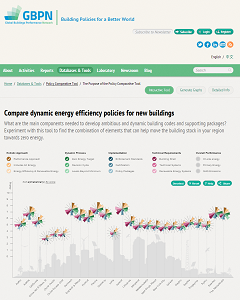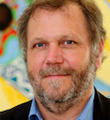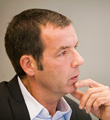Getting Building Codes Right: The Importance of Long-Term Energy Targets and Frequent Revision Cycles
13 November 2013
 This webinar is based on the lessons learned from the Global Buildings Performance Network’s Policy Comparative Tool.
This webinar is based on the lessons learned from the Global Buildings Performance Network’s Policy Comparative Tool.
View Webinar Content
Presentation—Introduction to the webinar and panelists
Presentation—Successes and Obstacles in Seattle: Global Building Performance Network
Presentation—Towards Nearly Zero Energy Buildings: The Netherlands’ National Plan
Transcript—Webinar audio transcript
<!–
4:00 p.m. CET | 10:00 a.m. EST
Check your local time. Reserve your seat now.
–>
The Clean Energy Solutions Center, in partnership with the Global Buildings Performance Network, has hosted a series of no-cost, webinar-based trainings on building energy code development.
To achieve significant greenhouse gas mitigation in the building sector, all new buildings need to be developed towards zero energy or positive energy standards. To meet such standards, mandatory, dynamic and ambitious building codes and supporting policies should be incorporated into long-term strategies. Despite the strong awareness of the need for such standards, practical knowledge about how to develop and implement these standards is often missing.
The first webinar training in this “how-to” series, Getting the Building Codes Right: The Importance of Long-Term Energy Targets and Frequent Revision Cycles investigated the importance of setting ambitious energy targets and ensuring the systematic and regular update of the building code in light of those targets.
Code developers from the Netherlands, Seattle, and Denmark shared their experiences of developing progressive building energy codes to meet ambitious energy targets, and they provided the context that has supported the move towards zero energy, including politics, market conditions and technical capacity.
Panelists
 Duane Jonlin, AIA and Energy Code and Energy Conservation Advisor, Department of Planning and Development, Seattle, Washington
Duane Jonlin, AIA and Energy Code and Energy Conservation Advisor, Department of Planning and Development, Seattle, Washington
Duane Jonlin is the Energy Code and Energy Conservation Advisor for Seattle’s Department of Planning and Development, and primary author of the 2012 Seattle Energy Code. He represents architects on the Washington State Building Code Council and chairs its Energy Code Technical Advisory Group, developer of the 2012 State Energy Code. Previously, he was a principal at NBBJ— a global architecture, planning and design firm—where he led regulatory compliance, quality management and technical education initiatives. He is a professional member of AIA and ASHRAE with 30 years of experience in civic and institutional work. Duane has architectural degrees from the University of Washington and the University of Michigan. He has lectured extensively on accessibility, energy efficiency and construction technology.
 Jens Laustsen, Technical Director, Global Buildings Performance Network
Jens Laustsen, Technical Director, Global Buildings Performance Network
Jens Laustsen is the Technical Director of the Global Buildings Performance Network. In the past, Jens has been leading policy work for buildings at the International Energy Agency (IEA) developing recommendations for IEA countries, G8 and large emerging economies. Before joining IEA he developed building policies for the Danish Government for more than a decade. Recently, he worked as an independent international consultant within policies and initiatives for deep energy retrofit, low energy construction and green global growth. Jens has worked with various aspects of energy efficient buildings as well as architect as for governments, international organizations and for private companies.
 Hans van Eck, Unitmanager/Head of the Department of Domestic Buildings, National Building Codes and EU Directives, NL Agency
Hans van Eck, Unitmanager/Head of the Department of Domestic Buildings, National Building Codes and EU Directives, NL Agency
Hans van Eck (The Netherlands) is a Civil Engineer and has studied Quality Management, HVAC systems and Business organization and management. For more than 20 years, he has worked in the Agency NL organization, a division of the Dutch Ministry of Economic Affairs that carries out policy and subsidy programmes focusing on sustainability, innovation, international business and cooperation. As senior Programme Advisor, he developed several energy saving and rational use programmes for the Dutch government as well as for the IEA and the EU. He also participated in the Eastern Europe SCORE programme for Latvia (in the position of EU Phare Co-ordinator for Latvia 1995/1996, and in this role wrote a series of country analysis reports for the EU Commission). As Head of the Department of Domestic Buildings, he is responsible for implementing the Energy Performance of Buildings Directive (EPBD) in the Netherlands, as well as coordinatiing the Dutch representatives in the CEN (European Committee for Standardization) work in the field of EPBD. As target group manager for the installers and advisors in the Netherlands, he is responsible for the specifications and training requirements in this field. He has been Core-team leader and member of the Steering Committee in the Concerted Action EPBD I en II, and he is now the Workgroup Leader in Conceted Action EPBD III for Near to Zero Energy Buildings.
 Kevin O’Rourke, Manager, Low Carbon Technologies, Sustainable Energy Authority of Ireland
Kevin O’Rourke, Manager, Low Carbon Technologies, Sustainable Energy Authority of Ireland
Kevin O’Rourke is Manager of SEAI’s Low Carbon Technologies team. He is responsible for providing research and advice to policy, institutional and market players to support the achievement of Ireland’s renewable energy targets for 2020 and beyond, and he serves as the focal point for national energy statistics and energy research. He has headed SEAI’s teams, assisting sustainable energy implementation in the business, public and built environment sectors. Most of his career has been in the fields of energy efficiency, renewable energy and environmental protection, working in government technology and development agencies, industry, academic research and the European Commission. He played a lead role in Ireland’s implementation of the EU Energy Performance of Buildings Directive (EPBD). He is a former chairman of the Energy – Environment Division and is member of the Executive of Engineers Ireland.
